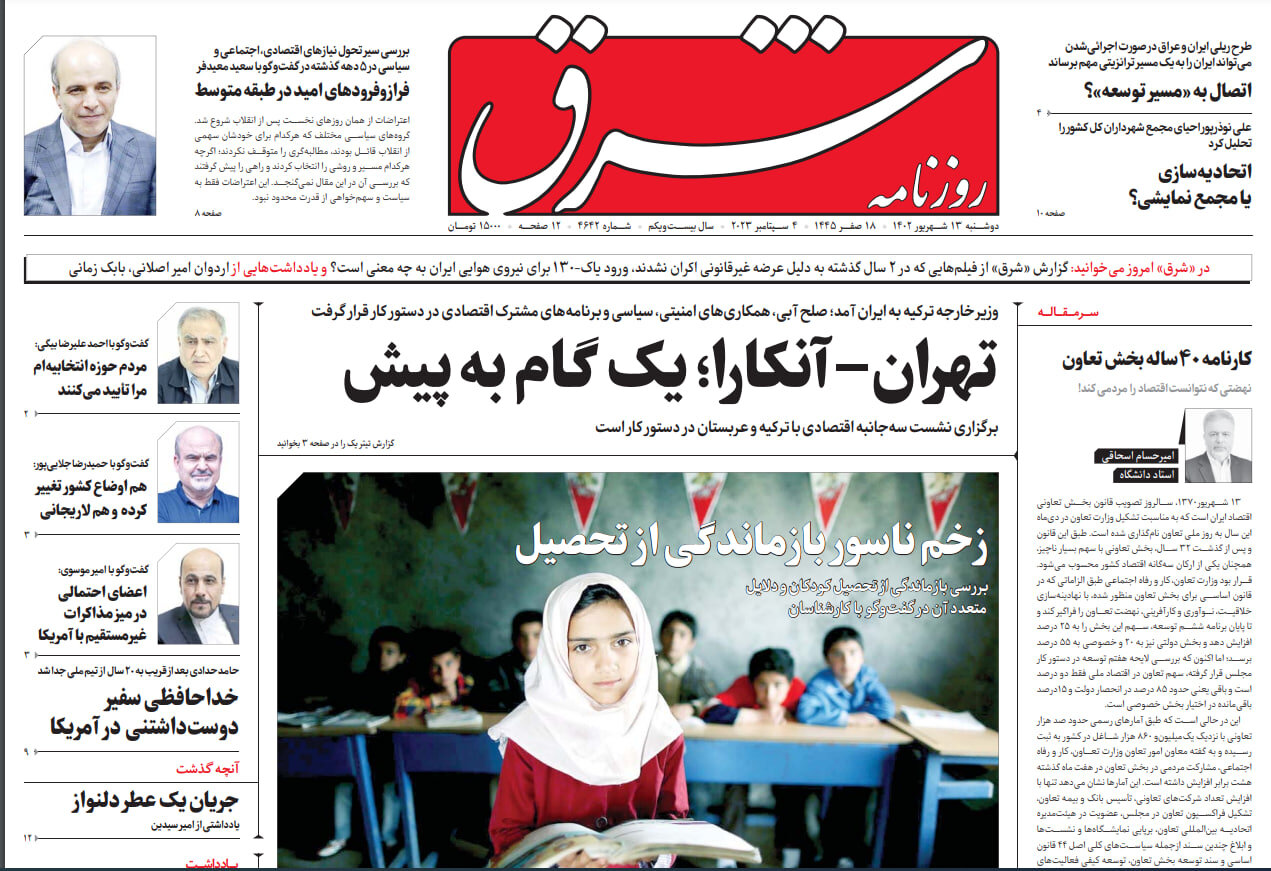Iran's adherence to nuclear deal entails complete sanctions removal

In a note, Shargh addressed the new report that Rafael Grossi is going to publish on Iran’s nuclear program.
It wrote: This report is important for analysts and experts in two ways; first, they are waiting to see which of the issues mentioned in this report by the Western media over the past or two months regarding cooperation between Iran and the IAEA is true; and secondly, how much progress has been made in the cooperation between Iran and the IAEA regarding the remaining disputed issues.
Iran is cooperating with the intention of limiting the tensions so that it can conclude the sanctions-lifting negotiations. In this case, Iran has put the strategy of "cooperation while using nuclear levers" on the agenda. Tehran's tactic is to resolve issues on a case-by-case basis so that it can maintain its bargaining tools and leverage for all stages of the talks. Mohammad Eslami, the head of the Atomic Energy Organization of Iran, in his latest statement, referring to the continued cooperation of his organization with the International Atomic Energy Agency, said that Iran's nuclear program cannot be eliminated by military action or sanctions. He added adherence to the nuclear agreement by the U.S. and other parties and a complete lifting of sanctions will lead to Iran’s adherence as well.
Vatan-e-Emrooz: Strategic rail
In a commentary, Vatan-e-Emrooz discussed the ground-breaking operation of the 32-kilometer Shalamcheh-Basra railway in the presence of Iranian Vice President Mohammad Mokhber and Iraqi Prime Minister Mohammed Shia al-Sudani. The paper said: After years of waiting with the efforts of the 13th government, the construction of the Shalamcheh-Basra railway as a missing link of the Iran-Karbala railway system started yesterday at the border point. This railway line will reach to the Mediterranean Sea and the port of Latakia in Syria. The inherent features of rail transportation, which the greatest advantage of it is high capacity of safe passenger transport with low cost, show the necessity of connecting Iran to Iraq by rail. According to experts, with the construction of the Shalamcheh-Basra railway, the income of the Iran Railway Company will increase significantly. The high volume of goods exported from Iran to Iraq has made the issue of transportation infrastructure between the two countries very important. Completing the Shalamcheh-Basra railway, in addition to causing a jump in trade and commerce between Iran and Iraq, will also provide access to other countries located in the east of the world to Iran's railway lines.
Ham Mihan: Unwritten understanding between Iran and America!
In an article, Ham Mihan discussed the process of negotiations between Iran and the United States and said: Although the authorities of Tehran and Washington directly refuse to confirm the existence of an agreement, it can be understood from some of the recent comments of the officials in Iran that the understandings between Tehran and Washington go beyond the issue of prisoner exchange and the release of Iran's blocked assets. The media have also published numerous reports that show issues such as "reducing the acceleration of high-enriched uranium production, reducing limitations on Iran's oil exports, not trying to seize Iran's oil tankers, reducing tension in the region and not having an armed confrontation between Iran-backed groups and the U.S. military" are among the things that, according to the evidence, are part of the unwritten understanding between Iran and the United States. Foreign Minister Hossein Amir Abdollahian said: "Tehran has the necessary political will to reach the point of agreement and wants all parties to implement the JCPOA agreement." Regarding the use of political diplomacy to cancel sanctions, there is now an initiative from the Sultan of Oman on the table. Within the framework of this initiative, there is an exchange of messages between us (Iran) and other parties.
Javan: Reducing effectiveness of sanctions with BRICS
In a commentary, Javan wrote currently no single country has enough power to confront the West politically and economically, but if countries with different potentials come together, they can pose a great threat to the concentration of power in the West and form blocs. Therefore, Iran's membership in two important organizations - the Shanghai Cooperation Organization and BRICS - sends a strong signal to Iran for deep and purposeful international economic cooperation to solve the economic problems caused by the oppressive sanctions of the United States. It will be through strengthening international economic cooperation and expanding cooperation with countries with superior economic power outside the Western bloc. It is expected that this international cooperation to reduce the effects of international sanctions and have significant effects on increasing the value of the national currency.
Leave a Comment